Title: The Orphan’s Takes – In The Night Garden
Author: Catherynne M. Valente
Genre: Fantasy
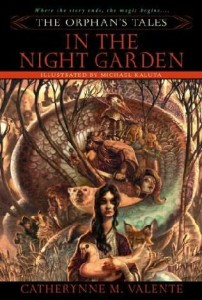
Publisher: Spectra
Publishing Date: October 31, 2006
Paperback: 496 pages
Stand Alone or series: First of a two-volume series. The second book, The Orphan’s Tales – In The Cities of Coin and Spice was published in 2007.
Why did we read the book: It was recommend to us by a LOT of people, including Kristen from Fantasy Cafe and AnimeJune from Gossamer Obsessions. How could we say no?
Summary: (from amazon.com)
Secreted away in a garden, a lonely girl spins stories to warm a curious prince: peculiar feats and unspeakable fates that loop through each other and back again to meet in the tapestry of her voice. Inked on her eyelids, each twisting, tattooed tale is a piece in the puzzle of the girl’s own hidden history. And what tales she tells! Tales of shape-shifting witches and wild horsewomen, heron kings and beast princesses, snake gods, dog monks, and living stars — each story more strange and fantastic than the one that came before. From ill-tempered “mermaid” to fastidious Beast, nothing is ever quite what it seems in these ever-shifting tales — even, and especially, their teller. Adorned with illustrations by the legendary Michael Kaluta, Valente’s enchanting lyrical fantasy offers a breathtaking reinvention of the untold myths and dark fairy tales that shape our dreams. And just when you think you’ve come to the end, you realize the adventure has only begun.
REVIEW:
First Impressions:
Thea: The first impression I had when I started In the Night Garden was of Scheherezade and Arabian Nights – of sleepless nights filled with endless tales of heroic quests, monsters, and magic. This novel is Ms. Valente’s version of the 1001 nights, and it is a spectacular undertaking of a novel, weaving story within story within story a hundred times over. The prose is lush, the illustrations beautiful, storytelling completely enchanting – as with the Sultan to his Scheherezade, or the young boy prince to the strange orphan with her black rimmed eyes, I found myself enthralled by these strange, gorgeous tales.
Ana:Welcome to a rare event here at The Book Smugglers: we present you Bad Smuggler/Good Smuggler, featuring Ana, as The Bad Smuggler.
When I first started reading In The Night Garden, I was completely enamoured with it and I couldn’t agree more with Thea’s assessment above. The fascination lasted for about 200 pages or so and then, all of a sudden, it was no more. This book, in principle, should have been catapulted to my list of all time favourites and yet, it hasn’t. To say that I am totally befuddled with myself is to put it very mildly.
On the Plot:
Thea: It’s hard to talk about a traditional plot with In the Night Garden – on the outermost layer, it’s the story of a young, handsome princeling who discovers a mysterious girl in the gardens surrounding the sultan’s castle. Though of a noble family, the girl was born with a birthmark, surrounding both eyes with dark, inky black circles so she was cast out of the palace as a demon. The young boy, however, sees the orphaned girl and talks to her, and she tells him a story unlike any he’s ever heard before. The girl tells the prince two full stories, separated into two books in In the Night Garden, The Book of the Steppe, and The Book of the Sea, though the second story loops around and overlaps with the first. The Steppe begins with a simple tale of a crown prince who itches for adventure and discovers a flock of geese surrounding a witch’s cottage at the edge of the woods. When he kills one of the geese and it turns into a young woman, however, the Prince’s story grows stranger and stranger, as he learns the truth of the witch and her daughter-goose, an old war, wondrous monsters with noble hearts and ferocious faces, evil wizards, and the magic of stars. As the girl tells the prince her tale, she leaves off each night with a Scheherezadian cliffhanger, promising to tell him the rest when the two next meet. The prince finds himself enthralled by the girl’s powerful words, and continues to seek her out night after night, begging her to tell him another story after she’s finished with the first.
What can I say about these stories? They are breathtaking. They are eerie and haunting and lovely and terrible and beautiful all at once. There is no doubt that Ms. Valente has a gift for storytelling to rival her orphan girl, seamlessly weaving mythological tales from different cultures into a stunning tapestry. Each story blends into the next, separated by episodic chapter headings according to narrator (“The Wolf’s Tale,” “The Pale Girl’s Tale,” “The Discourse of the Marsh King”), and offering lovely illustrations (by comic book artist Michael Wm. Kaluta below*).
The only drawback to the novel is that because there are so many characters and stories separated into different chapters, it can be a bit confusing to keep track of exactly whose story you’re reading – especially if you have to put the book down for a bit and then try to re-engage. In the Night Garden is a sprawling, circular novel with only a glimmer of a thread of linear storyline – of the orphan, the princeling and his angry sister – connecting the disparate tales. And that’s not a bad thing. It’s unique, it’s different, and I loved it.
Ana: I simply cannot fault this book with regards to storytelling, writing or presentation. It is a tour de force and I was completely awed by each story, by the amazing events and the sheer scope of ideas and stories presented. The author NOT ONLY spins tale after tale with a wonderful variety (from sad stories to happy stories, from fantasy to politics, from mythology to religion) but she also makes them unique with very original twists to well-known tropes. She makes fun of the Hero’s Quest, she has princesses looking like monsters and being hailed for it, she has the Girl saving the Guy and so and so forth until one’s mind is spinning along with the stories themselves. This is a highly polished book that defies convention not only in format but also in content. It doesn’t go from A to B in a straight line (plot-wise or character-wise) and to expect it to read like that is a sure way to invite disappointment.
From a strictly intellectual point of view, the book is pretty amazing. For all intents and purposes, I should have loved the book. The IDEA of the book itself is mind-blowing in its creativity and the author’s mastery of storytelling is akin to people like Neil Gaiman and this is a comparison that I do not take lightly.
HOWEVER. Not all stories are interesting. I found myself bored with a few, and after a while when a new story began and I hadn’t seen the end of the previous one, I started to moan to myself “OMG, not another one”. But my main problem , if I can call it that, was that if I apply my sorry attempt of a reviewing process to it, I realise that the most important piece, at least for me, is missing. It goes something like this:
Is this is well written book? Hell yes.
Is it believable (you know, in the confines of the genre and the story, not that I believe that there ARE griffins and monopods for reals)? Yes, Quite
Do I care? Hummm…Yes?
How much do I care? Not much.
And that is all there is to it. I lacked an emotional connection with the characters because there were so many and they came and they went. This goes back to what I said about convention and I find myself one that is disappointed; but above all, would you believe it, I am disappointed in ME, because I wanted to really love this book and I didn’t, despite how much I like the premise and how much I enjoyed the beginning . Instead I rushed through the final 200 pages, I even committed the Sin of Skimming. And I feel like I am losing something by even admitting to it. Colour me surprised by my own reaction. This is clearly a case, of “It’s not the book , it is me”.
*Art pictured is not from In the Night Garden, but is Orphan’s Tales inspired art from Mr. Kaluta. For more images of his gorgeous art, look online HERE.
On the characters:
Thea: This is where things get even more tricky – there are SO MANY characters in this novel, one for each chapter, who flicker into and out of the book briefly. There is no real traditional “hero” or “heroine,” (arguably the main characters would be the orphan girl and the prince) but there are many, many memorable characters whose stories – no matter how brief – touched me. The Witch woman in the first story, “The Tale of the Prince and the Goose,” and her wise Grandmother and her poor, war-defeated people; the heron-headed Marsh King and his sole courtier, the Lucrotta named “Beast”; the terrible, stinking Wizard who yearns for the power of the stars; the lone sad pumpkin tree and her garden, with her friend the firebird; three cynocephaloi, dog-headed brothers; the brave and strong Sigrid weaving her nets; the tragic Eyvind, a man who was a bear. I think my favorite character, however, existed outside of the orphan’s tales, in the form of the prince’s eldest sister, Dinarzad. She punishes her younger brother for sneaking out of the palace, and for his dalliance with the demon who could curse their home – and even though both characters are two insignificant heirs as the Sultan has many, many children, Dinarzad is the one who insists on propriety, who “would have been sultan” were she not born a woman. Over the course of the book, outside of the orphan’s stories, we learn tantalizing bits about Dinarzad and why she is so harsh to a younger brother who wants to rebel.
Ana: When I finished the book I emailed Thea and I told her I was SO conflicted about it and mostly because of lack of a character arc to get me going and she replied talking about the characters above. She is right, on all accounts – all of these stories and characters ARE interesting, I can SEE that. But somehow, they were all passing, fleeting connections.
I really wanted to read more about the girl, the prince and Dinazard and I was completely frustrated to find out in the end that I would have to read yet another book with another handful of stories like these to finally be able to see how it all ends. I am completely aware of the fact that I am reading this with not quite the right frame of mind, that I am missing the point, that this book is the sort of the book where the journey matters more than the final destination.
I think that the greatest thing that came out of reading In The Night Garden though, was what I found out about me, as a reader. I constantly say that character trumps plot but that story trumps all and I found that this sometimes, is simply not true. Maybe to me, character trumps all, even story. Maybe, I am more conventional than I thought I was.
And I realised that this ended up being a review of my own reading the book than of the book itself – isn’t that great though? When a book sparks this sort of reaction?
Final Thoughts, Observations and Rating:
Thea: I can understand why some might find this sort of labyrinthine story with its many characters, flashing bright only to vanish completely like fallen stars themselves, might not appeal to some readers. But I? I loved it. It may have been a taxing experience to read this novel, and it required me to focus and challenge myself to keep track of the story at hand, to read large chunks of the book at a time lest I break the spell that held me in the Ms. Valente’s thrall…but I still loved it. This is not a book you pick up casually to read in starts and stops, nor is it a traditional novel in the sense of the word. But what it is, is a beautiful, imaginative, haunting work of fiction that resonates with all its wonder and eeriness. I loved it.
Ana: I don’t think this is a book for everybody – but then again, which book is? It requires attention, and time from the reader and some, as positive reviews all over the place and Thea’s own reaction attest to it, will be rewarded with the sheer magnitude of Catherynne M. Valente’s imagination. I am so sad that I am not one of them. I feel like a kid standing outside a Christmas’ shop staring to the marvellous things inside without being able to enjoy them. Mind you, it’s not that I didn’t like it – I just didn’t love it either.
Notable Quotes/ Parts:
Ana:
One of my favourite characters and stories – was that of the Beast and the Marsh King. This was by far the most hilarious thing I read in a while and we all know how much I love comedy.
The Marsh King transforms a bear into a man and he is to remain so…
“until”, and here he (the Marsh King) cleared his long blue throat dramatically, “the virgin is devoured, the sea turns to gold, and the saints migrate west on the wings of henless eggs.”
“In the Stars’ name, what does that mean?” I (the Bear) gasped.
“I haven’t the faintest idea! Isn’t it marvellous? Oracles always have the best poetry! I only repeated what I was told, it is rather rude of you to expect magic, prophecy and interpretation. That’s asking quite a lot, even from a King.” He appeared quite flustered, feather blushing up into an indignant violet. “Just, well, keep a lookout for that sort of thing, don’t you know. Sea turning to gold. Hard to miss, I’d say. Rather. Lucky to have such obvious signs. I should think you would be grateful.”
Thea: I loved that section too! And I marked it as a notable part. But I have two other favorites to show just how varied a book this is, with each tale. First, from “The Gardener’s Tale.”
I am a tree.
But it is easy to say this tree is me. I was born when the tree before it dropped seed; I opened my eyes underground and ate dirt, dirt like cake and jam and wonderful water dripping through the earth like honey through a sieve. I was always thirsty.
And one day I came up through the ground in a little green shoot. I opened the shoot as easily as a door, and stepped out into the sun, a child like any other child. But I still slept in the tree every night as it grew, and as I grew. I loved it like a limb, and it loved me like a torso, and we were very happy together.
And the second, from “The Wizard’s Tale.”
“Demons!” he bellowed, full of horror.
“Children! My children, my beautiful hatchlings. They are perfect! You did not take the time to discover the nature of our order before you ruined us. I do not worship the serpent god — I am the serpent god! I sat in the sky when the earth was nothing but air. Once a month I return to my old form to bathe in what thin, distant light I can glimpse, and they with me, for you touch me and touch me and take me from myself, so that I have nothing left with which to nurse them. I have given you a litter of demigods, Indrajit, who would have filled a thousand books with their deeds. Now they are nothing and you are damned.”
[…]At this she lunged at him, sighing again into her serpent-self. But Indrajit signaled and in a breath twelve of the Varaahasind were at his side, and the Captain had sliced off the serpent’s ponderous head with a clean stroke of his blade.
It was the decree of the Raja that a great feast was to be held for the Varaahasind that night. The body of the great snake was dressed and quartered, and sent down to the bubbling kitchens. Each of the men was to eat his share of the succulent meat, so that Zmeya could never return, trailing that doom behind her. And Indrajit himself would eat her swollen heart, and so take the strength of the serpent-god into his breast, and spread his reign across the sea.
For a full excerpt from the book, check the author’s site HERE.
Additional Thoughts: The Orphan’s Tale is written in the style of One Thousand and One Nights – or Arabian Nights – a collection of Persian folk tales that date back to the 9th century, and which seems to be one of the earliest examples of the “stories within stories” narrative, if not the first. The basic story is that of a sultan who after discovering his wife cheated on him, had her executed and proceeded to marry virgins and only to have them beheaded the morning after the wedding night. His vizier’s daughter, Scheherazade, offers to be the next bride, and on their wedding night she begins telling him a story. When the morning comes and she has not finished her tale, the sultan decides to postpone the execution until the following day so that he can learn how the story ends. That night Scheherazade expands on the tale with another interconnected one, and so on and so forth for 1001 nights and by the end of it, the sultan finds himself happily married.
Amongst the most famous stories that Scheherazade tells are Ali Baba and The Forty Thieves (“Open Sesame!”) and Aladdin and the Wonderful Lamp. Ana’s favourite is The Seven Voyages of Sinbad The Sailor which were immortalized in 3 wonderful stop-motion movies by His Awesomeness Ray Harryhausen. One of the favourite movies when growing up is Sinbad and the Eye of the Tiger (with the tiger and the baboon) because it is SUCH a great adventure:
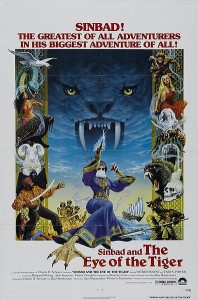
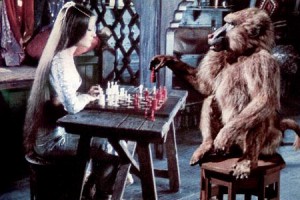
Thea’s favorite (besides of course Ali Baba and the Forty Thieves, Aladdin and the awesomeness of Sinbad – I used to have this glorious illustrated version of the Sinbad stories) was the story of the fisherman who is able to trick the Efrit he catches in his net out of killing him and back into his bottle. There’s also “The Brass City” which is eerie and wonderful, but I’ve only read that particular tale recently.
We also recommend the recent(ish) three-hour long TV Miniseries (starring a stunning Mili Avital as Scheherezade, Dougray Scott as the mad sultan Shahryar, Rufus Sewell as Ali Baba, Jason Lee as Aladdin, and John Leguizamo as the Genie) which is great fun!
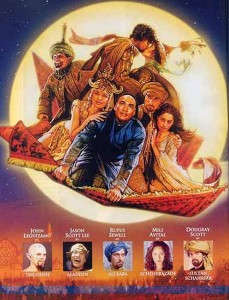
Rating:
Ana: I haven’t got a clue how to rate this. It is a GREAT book but not for me
Thea: 9 Damn Near Perfection
Reading Next: Give Up The Ghost by Megan Crewe

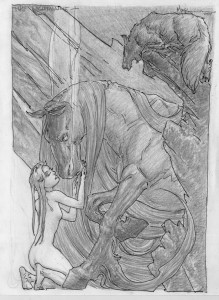
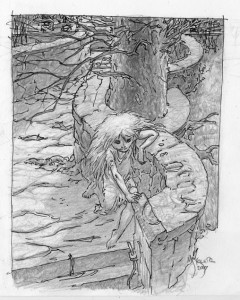










8 Comments
AnimeJune
September 11, 2009 at 8:43 amThea –> I’m SOOO glad you liked it! I agree the characters were short but I found that I felt for ALL of them, and that they were beautifully rendered in the limited page space they had. The second book is just as good (and has a kleenex-worthy conclusion). Just the language and the imagery as well as the characters totally blew me away.
Ana –> You and I read alike in a lot of ways – if we love the characters, the plot doesn’t always matter. That’s why I’ll like a book like Meljean Brook’s “Demon Angel” because the characters are well-rendered even if the plot is a little twisty. However, I found I could connect with all the characters of this story even though their time may have been short (MAY – without spoiling anything I will say some return in the second volume). I thought the way Valente described the characters really touched me emotionally even if their stories didn’t last long.
I also TOTALLY understand your reaction to the book – I’ve had that experience, too. I think my best example of this would be my reaction to Sherry Thomas’ “Private Arrangements.” Intellectually I realized it was a well-written book with unique characters and settings but when I set the book down, how much did I remember and care about the characters? Very little. I still can’t understand why I didn’t catch on to “Private Arrangements” (especially since I adored “Not Quite a Husband”).
Karen Mahoney
September 11, 2009 at 9:36 amThanks for such a thoughtful, indepth review (as usual). I couldn’t help smiling to see that Ana was the “Bad Smuggler” for once. 😉
But seriously, Ana, you’re not really being “bad” or “mean” in any way. Your review brilliantly captures your emotional reactions to the book, and you’re more than fair in your assessment. Clearly you can see all the great qualities that Thea can, it just wasn’t the book for you.
I’ve not read it myself, though I certainly will read it one day. I’ve got PALIMPSEST on my shelf, so I’m looking forward to trying that. 🙂
Britt, Book Habitue
September 11, 2009 at 9:47 amSounds interesting… Off to add it to my TBR list!
KMont
September 11, 2009 at 10:35 am*it required me to focus and challenge myself to keep track of the story at hand*
Oh my – I’m glad this paid off for you. I am definitely not in the right frame of mind lately to be challenged when reading. I realize how this sounds, but hopefully it’s just a phase passing through. Oh please let it be.
Ana, you are just so…bad. How could you explain yourself SO thoroughly and give plenty of reasons for your thoughts/feelings on the book? *shakes head*
Seriouslyt though, I can understand going through a lot with a book, but then it becomes too much to the point I no longer care. Been there, done that and recently, too. Doesn’t make you the bad one at all. Actually, I applaud you for persevering.
pamelia
September 11, 2009 at 6:19 pmThis book and its sequel were books I loved so much that I bought them for several friends for Xmas right after I finished them. I loved them, but they took me a LONG time to read. I would read a few segments and then put the book down for a week or two and then grab it again and so on till I was done. So, Ana, I totally understand your ambivalence. I had a hard time getting caught up in the book, but then something about the way it was all weaving together and the way the stories nested together really got me and I was hooked. It was dreamlike in its appeal. Nothing was clear and concise and nothing really explained A.B.C., but the way everything meshed and stuck with me? I can’t recommend these books too highly, but they are NOT an easy read! Thanks for the wonderful review, ladies!
pamelia
September 11, 2009 at 6:21 pmI mean I can’t recommend these books highly enough! Sheesh! I guess I shouldn’t drink and post comments, huh?
Kristen
September 11, 2009 at 7:52 pmGreat review, Thea and Ana! I really enjoyed reading both your thoughts.
Thea – I am so glad you loved this one. It’s definitely not the easiest read, but it is an amazing, unique, imaginative story. I loved the prose, all the different characters, and the way the tales were interwoven.
Ana – You did a great job describing what you thought about this one. As much as I loved In the Night Garden, I can completely understand where you are coming from. It was fantastic and I did enjoy it a lot – but it didn’t make it to my list of absolute favorite books EVER in spite of that. And that was only because there wasn’t that character connection. The characters were interesting and well-written but with so many of them there weren’t any that you really got to know. Oh yes, and the Beast and the Marsh King was one of my favorites too. The Marsh King cracked me up; I liked his story about the prince who wanted to slay the beast. 🙂
The Book Smugglers » Blog Archive » Smugglivus 2010 Guest Author: Catherynne M. Valente
December 3, 2010 at 12:02 am[…] acquainted with Ms. Valente’s work last year when a good blogging buddy recommended we give The Orphan’s Tales: In the Midnight Garden a try (and holy crap, Thea loved it). Having read her work, and after Thea heard Cat read from her […]